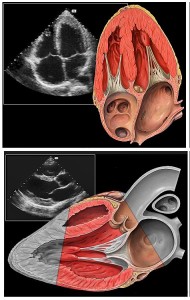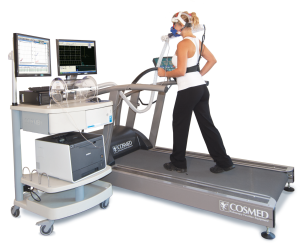- Diagnostic tests are the basis for effective treatment of cardiovascular diseases.
- The earlier diagnosed and diagnosed abnormalities, the greater the chance of avoiding diseases that are very serious for health and life, such as, for example, ischemic heart disease, hypertension or heart attack.
- We have the highest quality diagnostic equipment available on the market
- We invite you to our new cardiology clinic in the Piastów Office Center.
Echocardiogram is a sonogram of the heart muscle. The echo of the heart allows to analize the structure of the heart by measuring the volume, thickness of the walls, contractility of the heart walls, and in particular:

Medical Illustrations
by Patrick Lynch,
Center for Advanced
Instructional Media,
1987-2000.
- construction and functioning of heart valves,
- measurement of the size of the heart cavities and myocardial contractility,
- diagnosis of intracardiac blood flow using the Doppler method (colored),
- diagnostics of heart defects and myocardial tumors,
- diagnosing the presence of fluid in the pericardial sac.
What does the examination look like and how to prepare for it?
During the examination, the image from the device is visible on the monitor. Thanks to this, you can determine if there are any irregularities in the structure or functioning of the heart. . In the basic form (echo of the heart) does not require preparation, but for example in the case of transesophageal echocardiography, it is necessary to remain fasting.
Holter ECG monitoring is a non-invasive examination involving continuous recording of hearths rythm for later detailed analysis. For 24 hours or more (maximum 7 days), patient is connected to special device that records hearts work, during everyday activities.
Indications:
- Fainting and loss of consciousness of cardiac origin.
- Heart arythmia.
- Coronary disease and condition after myocardial infarction.
- Conduction and pause blocks in cardiac work requiring treatment with pacemaker implantation.
- Rhythm assessment after pacemaker implantation.
- Observation of some congenital heart diseases.
Ambulatory blood pressure monitoring (ABPM) allows to examine the pressure of heart. This is a diagnostic test involving the automatic, full day monitoring of blood pressure by a special device. The patient wears a pressure-measuring sleeve and a special device to record the measurements for 24 hours. Results are more precise and show the variation of the patients blood pressure levels.
The resting ECG test is performed at rest, i.e. lying down. Electrodes are attached to the patients wrists and ankles and they record the heart’s function. (electrical recording of myocardial work). The record is read on a monitor or graph paper.
This is the basic examination performed at the Dom Lekarski Medical Center during a cardiological visit.
Electrocardiographic Stress Test is a non-invasive test that measures the heart activity during external stress. Doctors can examine the symptoms, irregularities and hearts response.
Indications:
- diagnosis of chest pain
- diagnostics of non-specific changes in resting ECG
- assessment of the stage of ischemic heart disease
- assessment of the effectiveness of treatment of ischemic heart disease
- qualification for possible invasive tests (coronary angiography)
- qualification for the appropriate stage of rehabilitation in people after myocardial infarction and heart transplantation
- diagnosis of arrhythmias
- so-called early post-infarction tests
- assessment of the coronary reserve in persons planning to undertake intensive physical exercise,
- preoperative assessment.

ergospirometrii
Ergospirometry (cardio-pulmonary exercise test) is a non-invasive diagnostic method. This test involves the measurement and analysis of gases (oxygen and carbon dioxide) exhaled in the air by a patient who performs an exercise test on a treadmill or a cyclometer.
Thanks to the Ergospirometry we can determine the reaction of circulatory system, muscles, during physical exercise
This method is used to assess patients maximal physical performance before starting physical training and to evaluate training progress. It is useful in the medical diagnosis of professional athletes, but also for amateurs.
The Tilt test is a test to determine whether fainting , are caused by malfunctioning of the nervous system by releasing cardiac function and a drop in blood pressure when they need to be raised. Finding such a disorder is paradoxically good news for the patient because it means that there is no serious disease that causes it.
- Qualification is based on the assessment of the patient’s discomfort and the results of other non-invasive tests.
- You should be fasting before the test.
- You should determine with your doctor whether or not you need to discontinue other medications.
| PON | WT | ŚR | CZW | PT | |
| - | - | - | 9/27/18 15:30 - 9/27/18 19:00 | - | |
| MD PhD Tomasz Rozpara | - | 9/27/18 15:30 - 9/27/18 19:00 | - | - | - |
| 9/27/18 15:30 - 9/27/18 19:00 | - | - | - | - | |
| - | - | - | 9/27/18 15:30 - 9/27/18 19:00 | - | |
| - | - | 9/27/18 15:30 - 9/27/18 19:00 | - | - | |
| - | - | - | - | 9/27/18 15:30 - 9/27/18 20:00 | |
| - | - | - | - | 9/27/18 15:30 - 9/27/18 20:00 | |
Podane godziny są orientacyjne i mogą ulec zmianie.
